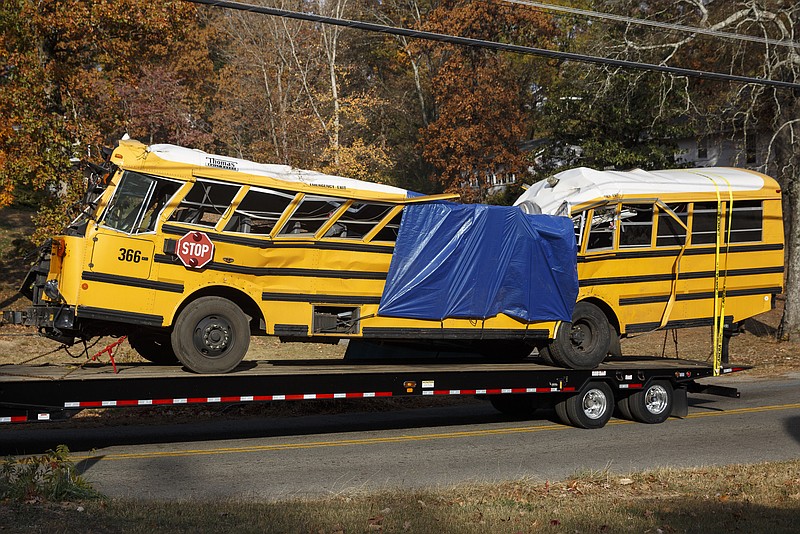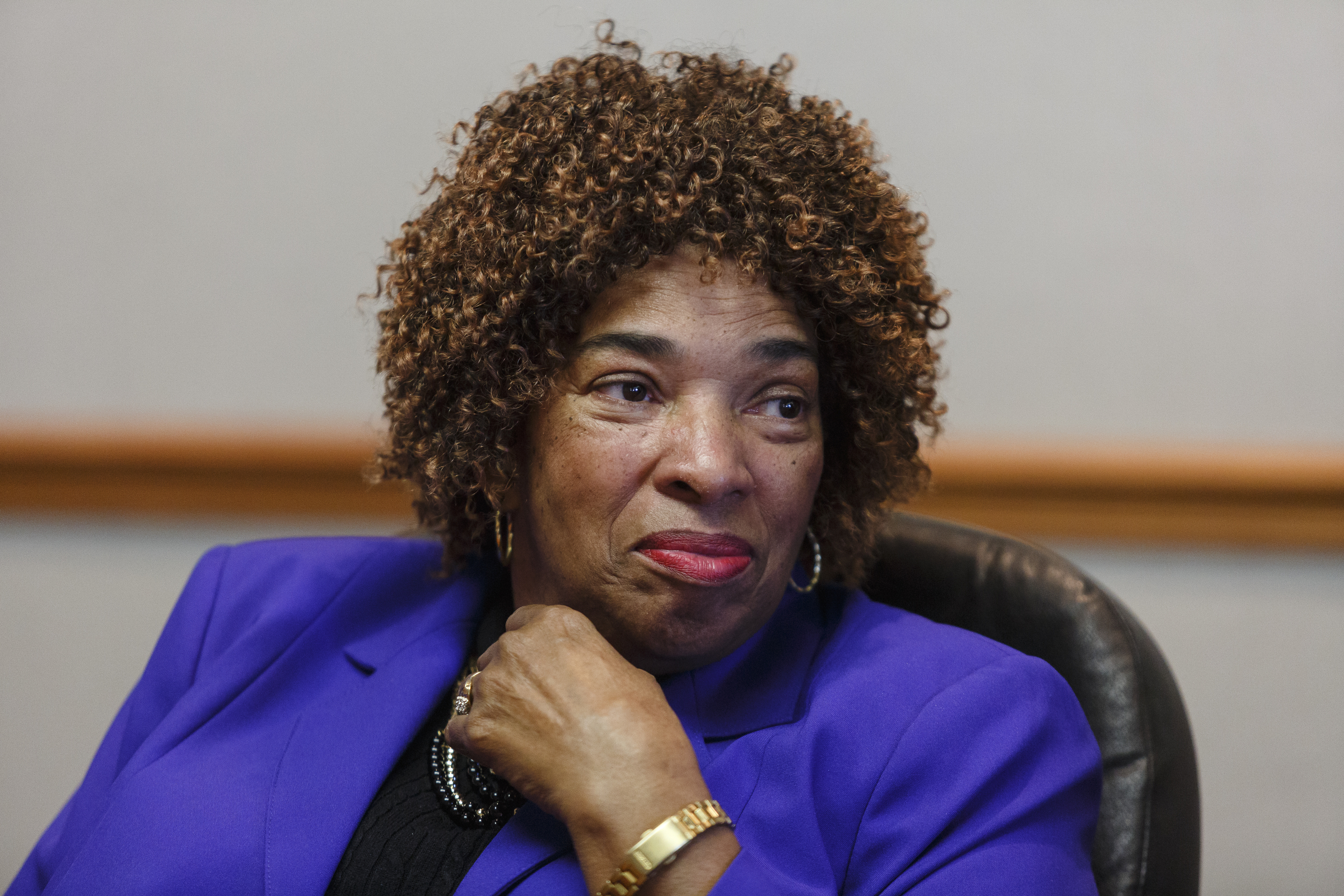
UPDATE: Rep. JoAnne Favors has filed the school bus seat belt bill.
ORIGINAL STORY: NASHVILLE - Gov. Bill Haslam and state Rep. JoAnne Favors have dueling approaches to address safety concerns after the Nov. 21 school bus crash in Chattanooga that killed si Woodmore Elementary School students.
Haslam introduced legislation Wednesday that seeks to address age requirements for school bus drivers and mandate new procedures for school systems, bus drivers and companies to follow.
But the governor's approach omits a requirement Favors wants that new school buses have safety belt restraint systems.
Favors, D-Chattanooga, said her bill, which she intends to introduce soon, calls for new buses purchased after July 1, 2018, and operated or leased by public or private school systems to have restraint systems that are federally approved.
Her intent is to phase in the requirement so that school systems and contract drivers or companies wouldn't be faced with huge expenses all at once.
Meanwhile, Favors said she agreed to introduce a bill, filed earlier Wednesday, that only addresses new age requirements for drivers and driver backgrounds. That was done at the request of Senate Minority Leader Lee Harris, D-Memphis, she said.
Favors said she won't be deterred by the governor's preferred approach, which rejects calls for school bus seat belts.
"It's needed because you do need restraints," she said. "I'm hoping it will pass [this year], but if it doesn't, it will involve us all in dialogue about this.
"And," the representative added, "we'll just keep doing it until we get it passed."
Haslam Press Secretary Jennifer Donnals said that "immediately after the tragic school bus crash in Chattanooga, the governor asked the Department of Education and Department of Safety and Homeland Security to spearhead efforts to help find ways to improve school bus safety."
Describing the bill as a departmental measure, Donals said "it starts the conversation in what we are sure will be a major topic of discussion with the General Assembly."
House Assistant Majority Leader David Hawk, R-Greeneville, who is carrying the governor's bill, said the tragedy has been an "emotional circumstance."
"My feeling is we need to do everything we can to ensure the safety of our children," he said, "so when their parents put them on the bus in the morning, they will return home safely that afternoon."
That wasn't the case in November in Brainerd when police say Johnthony Walker, 24, was speeding on Talley Road and lost control, crashing the bus carrying 37 Woodmore Elementary School children.
Walker, who was working for Durham School Services under a contract with Hamilton County schools, has been charged with six counts of vehicular homicide and reckless driving. Records obtained by the Times Free Press show Walker was involved in two previous crashes and underwent retraining with Durham after those incidents.
Parents, students and school administrators also complained about Walker's reckless driving and dealings with children before the fatal crash, according to Hamilton County Schools records.
But David Duke, CEO of Durham, told the Times Free Press that Hamilton County Schools did not share all of those complaints with Durham. Duke said the company could act only on the information it was given.
Since the crash, Durham has implemented an electronic system to track complaints, allowing both the school district and Durham a way to see any complaints made against drivers and how they were handled.
The National Transportation Safety Board continues to investigate the accident and hasn't said whether seat belts could have limited the number of fatalities or seriousness of the injuries sustained.
Both the Haslam bill and Harris' bill would raise required minimum ages of school bus drivers from 21 to 25 and require more than criminal background checks for prospective bus drivers to get commercial licenses.
But Favors said because school bus drivers told her there are some military veterans and law enforcement officers driving vehicles, she wants an exception for them, saying that Harris has agreed to amend it.
Haslam's bill is far more comprehensive, with new requirements for school districts and bus companies. It requires every local board of education and charter school governing body to adopt transportation policies "relative to the safe transport of students." Such lists are to include the following:
- A procedure for students, parents, teachers and staff, and the community to report school bus safety complaints.
- A procedure for the transportation supervisor to investigate any complaint of a safety violation or concern that would start within 24 hours of receipt.
- Within 48 hours of receipt of a complaint, a preliminary report is issued to the director of schools that includes the time and date of receipt of the complaint, a copy or summary of the complaint, the school bus driver involved, and any prior complaints or disciplinary actions taken against the driver.
- Within 60 school days of receipt of a complaint, a final report is issued to the director of schools in writing that includes any findings of the investigation and any action taken by the transportation supervisor in response to the complaint.
- A requirement that each school bus serving the district or charter school be equipped with the phone number for reporting complaints on the rear bumper.
- A process to provide annual notice to students and parents regarding the process for reporting complaints.
- A policy or procedure for the collection and maintenance of the following records, regardless of whether transportation services are provided directly by the LEA or charter school or via contractual agreement as authorized under state law.
Another lawmaker, Rep. Courtney Rogers, R-Goodlettsville, has a bill barring someone who has "committed a serious traffic violation" from obtaining a license if the incident occurred within three years of seeking a commercial license to drive a school bus. That includes violations such as speeding, reckless driving or accidents resulting in death or injury to anyone.
Former House Majority Leader Gerald McCormick, R-Chattanooga, first began pushing the idea of requiring school buses in Tennessee to carry seat belts. He held back after Favors, whose district includes Brainerd, said she would introduce legislation.
McCormick has said he is more than happy to work with Favors, and Favors said he informed her earlier Wednesday about the governor's bill.
Two similar efforts to require seat belts on buses, including a 2015 bill introduced as the result of a fatal bus crash in Knox County, have failed. Opponents say it would be hugely expensive and for years said there is no need for belts because of the way buses are constructed.
But the National Highway Transportation Safety Administration's top official more recently has said safety belts on school buses would be beneficial to students.
Contact staff writer Andy Sher at asher@timesfreepress.com or 615-255-0550. Follow him on Twitter @AndySher1.
Contact staff writer Kendi A. Rainwater at krainwater@timesfreepress.com or 423-757-6592. Follow on Twitter @kendi_and.


